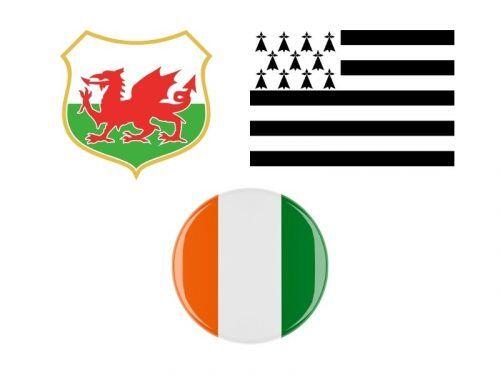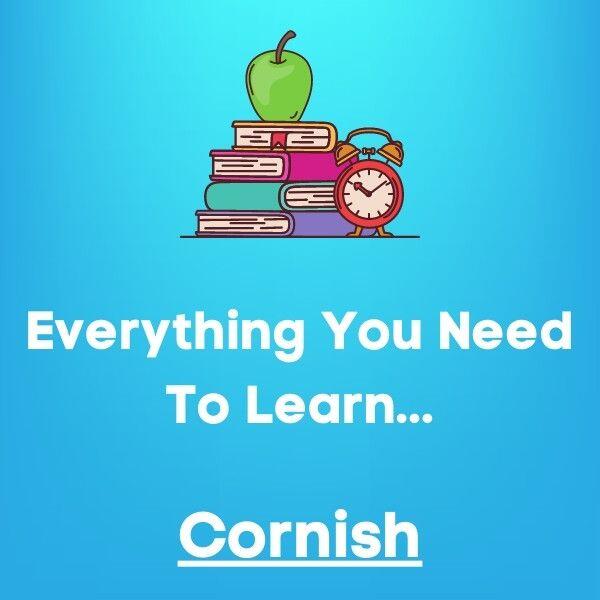Endangered Languages: The Cornish Language At A Glance
Part One: A Cornish Overview
What is Cornish? Is it a real language?
The Cornish language, known as Kernewek, is a previously extinct Indo-European language, and a member of the Brittonic branch of the Celtic languages. It was once the native language of Cornwall, Southwest England.
Cornish was traditionally spoken as a first language until the late 18th century, when, after centuries of being pushed south and restricted, it finally met its demise.
Why and when did Cornish die out?
English’s dominance eventually resulted in the language’s demise. In 1549, following the Act of Uniformity, there was a Cornish Rebellion that saw more than 4000 Cornish people killed.
The Act essentially enforced English as the national language by replacing Latin with English in all religious rites and ceremonies. This was a discriminatory act, owing to the fact that Cornish was the only language many people in England spoke. This is cited by many as the beginning of the end for the Cornish language.
In his essay, Antiquities Cornubritannic, William Scawen (1600–1689), a Cornish politician and advocate for the language’s revival, detailed sixteen reasons why the language was in decline at the time. Among them:
- the ruling class’s opposition to Cornish;
- the dominance of English in neighboring Devon
- Cornish records lost in the English Civil War (1642 – 1651)
- no Cornish translation of the Bible
- no Cornish theatrical performances
- lost contact with Breton-speaking cousins in Brittany
The language went extinct in 1777, following the death of the last native speaker, Dolly Pentreath, (though there is some evidence to suggest that it was still used as a second language well into the 19th century).
Does anyone speak Cornish? If so, how many people?
Yes. On the 2011 National Census, the number of people who selected Cornish as their main language was 557. This isn’t an accurate representation of total speakers, however, and this census was conducted over a decade ago. A lot has changed since then, thanks to concerted efforts of the government to encourage the teaching and learning of the language in Cornwall.
Thus, the number of Cornish speakers to date is said to be around 2000, most of whom speak it as a second language; and only a small percentage of those claim to be fluent. Many Cornish people do know a few words here and there, and naturally, some words will have entered into local English parlance.
Cornish language revival
The language experienced a revival at the beginning of the 20th century, following the publication of Henry Jenner’s instruction guide, A Handbook of the Cornish Language, in 1904.
Today, Cornish is being taught in a number of schools and colleges, mostly in and around Cornwall. The recognition of Cornish under the European Charter for Regional or Minority Languages (a treaty that aims to protect and promote endangered languages) also reunited enthusiasts’ interest, prompting the teaching of Cornish in universities, and the rise of local speaking groups.
Thanks to these efforts and campaigns, the number of speakers has doubled in recent years, and continues to increase, with more and more materials and resources being created to aid in teaching and learning.
Where is the Cornish language spoken?
Cornwall is where you will find the vast majority of speakers, and where the language can be heard all regularly, particularly around market stalls and shops that offer Cornish-themed gifts and food.
Aside from that, it is used in small pockets across Newquay, and in language groups run by enthusiasts.
Part Two: Similarities to Other Languages
Is Cornish similar to Welsh?
Due to the fact that Cornish, Welsh, Irish and Breton derive from the same language ancestor – Common Brittonic, they all share some similarities. With regards to Cornish and Welsh, they were once the same language, but due to people migration and Anglo-Saxon invasion, Cornish split off and became a distinct language of its own.
It is believed that Cornish and Welsh share roughly a 30% lexical similarity, with many everyday words being almost identical (if not in spelling, in pronunciation).
Have a look at numbers 1 – 10 in both languages:
| CORNISH | WELSH |
| onan | un |
| dew | dau |
| tri | tri |
| peswar | pedwar |
| pymp | pump |
| hwegh | chwech |
| seyth | saith |
| eth | wyth |
| naw | naw |
| deg | deg |
The grammar of Modern Cornish is said to be closer to an older form of Welsh, but there still remains some level of mutual intelligibility between the Cornish and Welsh of today.
Cornish and Breton, a recognized minority language spoken in Brittany, France, is much closer to Cornish than Welsh is, with perhaps 40% lexical similarity.
What we need to understand, however, is that since Cornish was extinct and the grammar and vocabulary texts used in reviving it are old and incomplete, revivalists have had to supplement the holes in the language with Welsh and Breton.
Meaning, Modern Cornish is closer to Welsh and Breton than perhaps it would have been had the language evolved naturally.
What does Cornish sound like?
Some say spoken Cornish sounds like a mix of Welsh and Irish. In my opinion, after listening to several different people use it, I’d say it’s more a mix of Irish and Scottish Gaelic.
I’m presented with a bizarre feeling whenever I listen to Cornish audio. My mind is blown! I feel as though I should understand it, because it sounds like a regular southwestern English accent. Yet, the words are unintelligible. This is the way I feel about Portuguese, as someone who’s studied Spanish; and Dutch, having studied German.
I find myself chuckling like a giddy schoolgirl every time I watch a Cornish video. Like I’ve stepped right back into medieval Britain and become surrounded by friendly pirates!
In this Wikitongues video, you can hear and marvel at natural, spoken Cornish. Someone in the comments section (quite accurately) described Cornish as sounding like English in reverse!
Now, bear in mind that the Cornish we hear today is heavily accented with English, and isn’t an accurate representation of a genuine Cornish accent.
All that said, I’m fascinated with this unique and poetic language. The more time I spend with it, the more endearing it becomes.
Part Three: Vocabulary and Grammar
The Cornish alphabet
The Cornish alphabet uses the Latin script and consists of twenty-four letters, the majority of which are either identical or very similar to their English counterparts. There is no “x”; “q” and “z” are hardly ever used, unless in English words. “Y”, just like in Welsh, is a vowel.
The construct “dh” is pronounced “th”.
If you want a guide on how to pronounce vowels, check out this short, free PDF book, The Vowels of Cornish.
Cornish grammar
A few things to note about Cornish grammar:
- adjectives go after the noun they modify, which is the reverse of English, whose adjectives go before their nouns.
- Cornish has no indefinite articles. This means that there are never any words like “a” or “an” in front of a noun.
- default word order is verb-subject-object, unlike English’s subject-verb-object.
Foreign influences on vocabulary
Cornish derives from Old Brittonic, which was heavily influenced by Latin during the Roman invasion of Great Britain. But more recently, from the 1300s, as England began to claim more and more dominance of the region, English words began entering into Cornish.
As such, Modern Cornish uses many English loan words, most notably when it comes to technology and electronics.
“How do you say … in Cornish?”
The following is a list of 14 common words:
| Hello | Dydh da |
| Goodbye | Myttin da |
| Good morning | Dyw genes |
| Yes | Ya |
| No | Na |
| Thank you | Meur ras |
| Please | Mar pleg |
| Excuse me | Gav dhymm |
| Sorry | Drog yw genev |
| Dog | Ki |
| Cornwall | Kernow |
| Merry Christmas | Nadelik lowen! |
| House | Chi |
| Love | Kerensa |
Useful Cornish phrases/sayings
If you’re thinking of visiting the beautiful Cornwall any time soon, here are some useful phrases to learn in order to impress the locals. So few people speak the language that any attempts from outsiders would be looked upon favorably. You’ll be admired for your efforts.
| How are you? | Fatel os ta? |
| Okay | Da lowr |
| What’s your name? | Py hanow os ta? |
| My name is… | Ow hanow yw… |
| Where is… | Ple’ma… |
| I am surprised. | Marth yw genev. |
| What’s going on? | Pandr’a hwer? |
| What’s the time? | Py eur yw? |
Part Four: Cornish for Beginners – Learning Cornish

Is Cornish easy to learn?
For a monolingual English speaker, Cornish can be a little taxing to get used to at first. Although it is an indigenous British language, it has very little in common with English (in fact, due to English’s Latin and Germanic roots, languages such as Spanish, French and German have more in common with English than Cornish does).
That said, modern Cornish has been heavily influenced by English, and as mentioned before, has a number of loan words, which makes it a lot easier to learn than it once was.
Pronunciation-wise, Cornish shouldn’t present any real issues for English speakers. The sounds in the language are sounds we regularly make in English, hence why spoken Cornish can sound like you’re listening to English but… not!
Why learn Cornish?
There are a number of reasons why you should consider learning Cornish. Some of them are:
The language is beautiful: If you’ve spent any time listening to it, you’ll notice how it just sort of flows. It has a fun, poetic sound to it. Every time I hear it, I imagine I’m eavesdropping on sailors.
You’ll be helping to keep the language alive: The volume of speakers is still low, which means it needs all the speakers it can get to avoid extinction… again.
It’s part of British heritage: If you’re British (and even if you’re not), it would be awesome to learn a language that’s not only older than English, but existed in England before modern-day English did.
You get a language discount: As mentioned previously, due to its evolution from Old Brittonic, Cornish still retains similarities with Welsh and Breton. For this reason, there is some level of mutual intelligibility between the three, which means that if you learn Cornish, you’ll be able to understand some Welsh and Breton.
Not quite 3 languages for the price of one, but you’ll definitely find it much easier and quicker to pick up the other two, should you wish to learn them in the future.
Literature: You’ll be able to read and enjoy some medieval Cornish literature dating back as far as the 12th century. Most of the surviving texts are in verse form – poetry and the like. Studying this could be a lot of fun, and gives you a unique insight into Britain at the time. Not many people are able to read such texts.
Join the community: There is a small but enthusiastic community of Cornish speakers who are passionate about the language and welcoming to all those who want to learn it. You’ll have plenty of support, perhaps even more than you’d get with a more widely spoken language, as Cornish speakers are committed to seeing the language thrive and spread.
Speak in secret: This is always my favorite part of learning an obscure language. With few speakers, the chances of you being understood anywhere in the world, even in Cornwall, are slim to none. If you’re a parent, you can teach your children Cornish and converse with them in it when you’re out in public.
Did I get your attention? Great. Now that you’ve seen all the awesome reasons to study Cornish, let’s find out where you can learn it.
Learn Cornish online free: Courses
GoCornish.org
Your first stop for all things Cornish should be Go Cornish, a site designed to help learners of Cornish – from absolute beginner to the more advanced learner. It’s a great resource where you can find everything from courses to online dictionaries.
The WJEC Entry Level Cornish materials should be of particular interest to you, as this course is completely free and is designed to get you speaking and listening, without focusing on grammar and all the boring stuff.
The site claims that these materials will get you to a basic conversational level within 10-12 hours. You can even gain an entry level qualification in Cornish after successfully completing the course and oral exam.
Though they’re designed to be used in a classroom setting with a teacher, if you’re interested in teaching yourself Cornish, you can get a lot out of them on your own.
Kesva
Kesva.org is the Cornish language board that not only has free learning materials but past exam papers for you to peruse, should you wish to make your Cornish skills official.
Their KDL online course is designed for people who are studying independently, outside of a classroom setting. They are split into grades, from 1 – 4, determined by skill level.
The examination section, likewise, is split into grades. You can also find information about exam enrollment dates and locations, plus what’s on the syllabus.
The learning section contains free teaching resources, mostly for classroom settings, but again, you’re free to use them in self-study.
Learn Cornish apps
Memrise
At the time of writing this, there are over 60 free Cornish courses available on Memrise, designed for learners at all levels. The Go Cornish: Grade 1 course, with over 1.3k users, seems to be the most in-depth and popular. This should be a good starting point.
More specialized lessons are available, such as those that focus solely on learning numbers, days and months, verbs etc.
Memrise can be used on desktop or as a mobile/tablet app.
Cornish Magi Ann Kernewek
This is a fun, colorful app for children and adults, that comes complete with 12 short, interactive stories that will teach your children (and you) Cornish. It’s available on both iOS and Android. Best part: it’s completely free!
Learn Cornish: EuroTalk (paid)
EuroTalk offers a full Cornish course, which covers the same things as the regular uTalk courses. At time of writing, the course was available on iOS only, for a price of £7.99.
I’ve used the uTalk/EuroTalk for another language – Kinyarwanda (you can read about my experience in the post Can You Learn A Language In A Day? Challenge Accepted), and overall I find it to be pleasant and very helpful in getting vocabulary to stick. It’s aimed at teaching in a fun, gamification type of way, so if that’s your thing, paying the low £7.99 price might be a worthy investment.
Can you learn Cornish on Duolingo?
Sadly, Duolingo does not currently offer a Cornish language course, though several people have requested it. You can follow the discussion on the Duolingo forums.
The company is constantly updating and expanding the app, so if enough people want a language added, and there are fluent Cornish volunteers willing to create the course, then you could see Cornish in the future.
For now, there are still plenty of other free and effective ways to learn Cornish.
Cornish Language Online Dictionaries
You’ll want a good online dictionary that you can access quickly and freely from your desktop or smartphone.
Akademi Kernewek Dictionary – A dedicated dictionary for Cornish.
Glosbe English/Cornish Dictionary – Not specific to Cornish, but still useful all the same, particularly if you want to translate to and from Cornish and languages other than English.
Freelang.net Dictionary – With 3091 entries, it’s not as complete as others, but it will do the job for cross-referencing purposes.
Books
Our Cornish Language Store has a small compilation of Cornish books, including dictionaries, grammar books, and stories.
A Handbook of the Cornish Language – This was the book that revived the Cornish language in 1904. As such, it is considered to be in the public domain. You can download a free copy from Project Gutenberg.
Cornish TV and Radio Programs
Radyo an Gernewegva is a great resource where you can find radio and TV shows in Cornish.
Learn how to speak Cornish in Cornwall
Getting fluent in Cornish will require dedication as well as frequent conversations with native speakers. If you live in the UK, you’re in luck. It just so happens that Cornwall is a beautiful place with breathtaking landscapes, some of the best weather in the UK, and friendly people. A week-long trip won’t set you back much.
Once there, you’ll be able to attend Cornish meetup groups, do some shopping in Cornish, and even attend a course or two with fellow beginners. This is the best way to learn the language, as you’ll be forced to use it.



